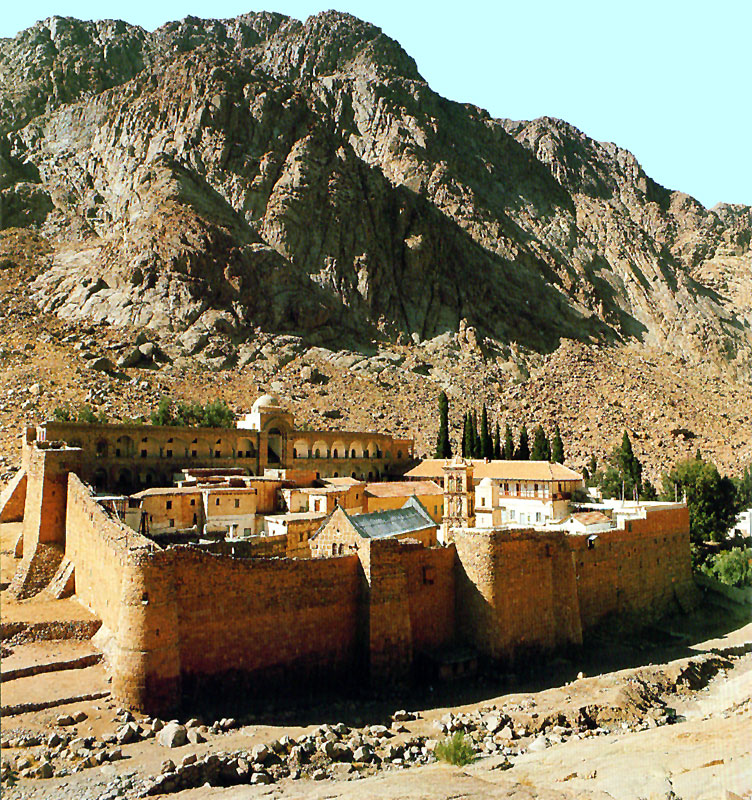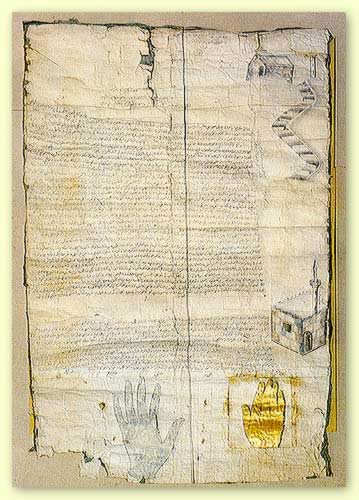النبي محمد وعد الآخرة للمسيحيين
وَأَوْفُوا بِالْعَهْدِ إِنَّ الْعَهْدَ كَانَ مَسْئُولً
Keep your promises; you will be called to account for every promise which you have made! (Quran; 17:34)
PROPHET MUHAMMAD'S PROMISE TO CHRISTIANS
  Muslims and Christians together constitute over fifty percent of the world and if they lived in peace, we will be half way to world peace. One small step that we can take towards fostering Muslim-Christian harmony is to tell and retell positive stories and abstain from mutual demonization. In this article I propose to remind both Muslims and Christians about a promise that Prophet Muhammed (pbuh) made to Christians. The knowledge of this promise can have enormous impact on Muslim conduct towards Christians. Muslims generally respect the precedent of their Prophet and try to practice it in their lives. In 628 AD, a delegation from St. Catherine’s Monastery came to Prophet Muhammed and requested his protection. He responded by granting them a charter of rights, which I reproduce below in its entirety. St. Catherine’s Monastery is located at the foot of Mt. Sinai and is the world’s oldest monastery. It possess a huge collection of Christian manuscripts, second only to the Vatican, and is a world heritage site. It also boasts the oldest collection of Christian icons. It is a treasure house of Christian history that has remained safe for 1400 years under Muslim protection.
The first and the final sentence of the charter are critical. They make the promise eternal and universal. Muhammed asserts that Muslims are with Christians near and far straight away rejecting any future attempts to limit the promise to St. Catherine alone. By ordering Muslims to obey it until the Day of Judgment the charter again undermines any future attempts to revoke the privileges. These rights are inalienable. Muhammed declared Christians, all of them, as his allies and he equated ill treatment of Christians with violating God’s covenant.
A remarkable aspect of the charter is that it imposes no conditions on Christians for enjoying its privileges. It is enough that they are Christians. They are not required to alter their beliefs, they do not have to make any payments and they do not have any obligations. This is a charter of rights without any duties! The document is not a modern human rights treaty but even thought it was penned in 628 A.D. it clearly protects the right to property, freedom of religion, freedom of work, and security of the person. I know most readers, must be thinking so what? Well the answer is simple. Those who seek to foster discord among Muslims and Christians focus on issues that divide and emphasize areas of conflict. But when resources such as Muhammad’s promise to Christians is invoked and highlighted it builds bridges. It inspires Muslims to rise above communal intolerance and engenders good will in Christians who might be nursing fear of Islam or Muslims. When I look at Islamic sources, I find in them unprecedented examples of religious tolerance and inclusiveness. They make me want to become a better person. I think the capacity to seek good and do good inheres in all of us. When we subdue this predisposition towards the good, we deny our fundamental humanity. In this holiday season, I hope all of us can find time to look for something positive and worthy of appreciation in the values, cultures and histories of other peoples.
References
See for example Life and Teachings of Muhammed by Amir Ali, p. 176. click to read it.
Links:
The original charter does not survive, but several copies are now extant in the library of St Catherine, some of which are witnessed by the judges of Islam in order to lend some force to its semblance of authenticity. The traditional explanation which accounts for the loss of the original claims that during the Conquest of Egypt by the Ottoman sultan Selim I in 1517, the original document was seized from the monastery by Ottoman soldiers and taken to Selim's palace at Constantinople.[2][1] A copy was then made to compensate for its loss at the monastery.[1] On the other hand, it is also possible that the charter was simply renewed under the new rulers, as other documents in the archive suggest.[3] Traditions about the tolerance shown towards the monastery were reported in governmental documents issued in Cairo and during the period of Ottoman rule (1517-1798), the Pasha of Egypt annually reaffirmed its protections.[1]
In 1630, Gabriel Sionita published the first edition of the Arabic text, with Latin translation, under the title Testamentum et pactiones inter Mohammedem et Christianae fidei cultores.
The origins of the document has been the subject of a number of different traditions, best known through the accounts of European travellers who visited the monastery.[1] These authors include the French knight Greffin Affagart (d. c. 1557), the French traveller Jean de Thévenot (d. 1667) and the English prelate Richard Peacocke,[1] who included an English translation of the text.
Since the 19th century, several aspects of the Achtiname, notably the list of witnesses, have been questioned by scholars.[4] There are similarities to other documents granted to other religious communities in the Near East. One example is Muhammad's letter to the Christians of Najrān, which first came to light in 878 in a monastery in Iraq and whose text is preserved in the Chronicle of Séert.[1]
نص العهد: "هذا كتاب كتبه محمد بن عبدالله إلى كافة الناس أجمعين بشيراً ونذيراً ومؤتمناً على وديعة الله في خلقه لئلا يكون للناس على الله حجة بعد الرسل وكان الله عزيزاً حكيماً كتبه لأهل ملته ولجميع من ينتحل دين النصرانية من مشارق الأرض ومغاربها قريبها وبعيدها فصيحها وعجميها معروفها ومجهولها كتاباً جعله لهم عهداً. لا يغير أسقف من أسقفيته ولا راهب من رهبانيته ولا حبيس من صومعته ولا سايح من سياحته ولا يهدم بيت من بيوت كنائسهم وبيعهم ولا يدخل شيء من بناء كنائسهم في بناء مسجد ولا في منازل المسلمين فمن فعل شيء من ذلك فقد نكث عهد الله وخالف رسوله ولا يحمل على الرهبان والأساقفة ولا من يتعبد جزيةً ولا غرامة وأنا أحفظ ذمتهم أين ما كانوا من بر أو بحر في المشرق والمغرب والشمال والجنوب وهم في ذمتي وميثاقي وأماني من كل مكروه فمن نكث العهد الذي فيه وخالفه إلى غيره وتعدى ما أمره كان لعهد الله ناكثاً ولميثاقه ناقضاً وبدينه مستهزئاً وللّعنة مستوجباً سلطاناً كان أو غيره من المسلمين المؤمنين."
تعتبر الجملتان الأولى والأخيرة في هذا العهد حاسمتان، فهما تجعلان الوعد أبدياً وعالمياً. يؤكد النبي محمد (ص) أن المسلمين يقفون مع المسيحيين من قريب وبعيد، ويرفضون فوراً أية محاولات مستقبلية للحد من وعد دير القديسة كاثرين وحده. من خلال أمر المسلمين باحترام الوعد حتى يوم القيامة، يُفشل الصك مرة أخرى أية محاولات مستقبلية لإلغاء الامتيازات. هناك ثلاثة حقوق لا يمكن التنازل عنها.
أعلن النبي محمد (ص) أن المسيحيين جميعهم حلفاء له حيث ساوى بين معاملة المسيحيين السيئة مع انتهاك عهد الله تعالى.
ومن النواحي المثيرة للاهتمام والإعجاب في الصك أنه لا يفرض أية شروط على المسيحيين للتمتع بميزاته. يكفي إنهم مسيحيون، ولا يُطلب منهم تغيير إيمانهم ومعتقداتهم ولا أن يدفعوا جزية ولا تكون عليهم أية التزامات. هذا صك حقوق دون أية التزامات.
ليست الوثيقة معاهدة عصرية في حقوق الإنسان، ولكنها، ورغم أنها صيغت عام 628 بعد الميلاد فإنها تحمي بوضوح حقوق الملكية والحرية الدينية وحرية العمل والأمن الشخصي.
أعرف أن معظم القراء سوف يقولون "وماذا بعد؟".
حسناً، الجواب بسيط: يركز هؤلاء الذين يبغون رعاية الفتنة بين المسلمين والمسيحيين على قضايا تتسبب بالفرقة والنزاع. ولكن عندما تطرح موارد مثل وعد النبي محمد (ص) إلى المسيحيين ويتم إبرازها فإنها تبني الجسور.
وهي تلهم المسلمين أن يرتفعوا فوق عدم التسامح الطائفي وتولد حسن النية لدى المسيحيين الذين قد يكونوا يتعاملون مع الخوف من الإسلام والمسلمين.
عندما أنظر إلى المصادر الإسلامية أجد بها أمثلة لا سابق لها من التسامح الديني والشمولية. تجعلني أرغب بأن أصبح إنساناً أفضل. أعتقد أن القدرة على السعي لما هو صالح وصنعه متأصلان فينا جميعاً. عندما نكبت هذا التوجه نحو الصلاح فإننا ننكر إنسانيتنا الأساسية.
آمل في أعقاب فترة الأعياد أن نجد جميعاً الوقت للبحث عن أمر إيجابي يستحق التقدير في قيم وتاريخ وثقافة الشعوب الأخرى.
St. Catherine's Monastery, Sinai, Egypt A Picture of Prophet Muhammad's Letter to St. Catherine's Monastery
Dr. Muqtedar Khan | 08.22.2010
This article was published in the Pittsburg Post-Gazette [03.25.2007], Daily News Egypt [03.09.2007], AltMuslim [03.03.2007], Pakistan Link, Middle East Window, Turkish Daily News [04.10.2007 ], OpEd news [03.19.2007],Ikhwanweb [02.11.07], and many other places..
http://www.ijtihad.org/Prophet%20Muhammed's%20Promise.htm
http://www.ijtihad.org/Prophet%20Muhammed's%20Promise.htm
Minorities in Islamic State: The hand book highlights the rights of minorites...
Read more:Protection of Minorities, a Religious Obligation of Muslims: http://islam4humanite.blogspot.com/2015/03/non-muslims-in-islamic-society.html
~ ~ ~ ~ ~ ~ ~ ~ ~ ~ ~ ~ ~ ~ ~ ~ ~ ~ ~ ~ ~
Humanity, Religion, Culture, Science, Peace
A Project of
Peace Forum Network Peace Forum Network Mags Books, Articles, Blogs, Magazines, Videos, Social Media Overall 2 Million visits/hits |
